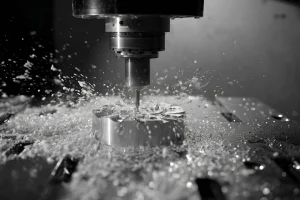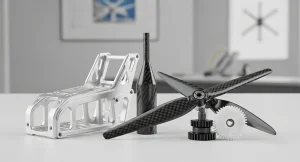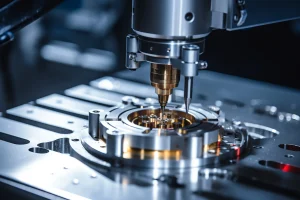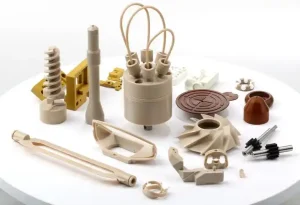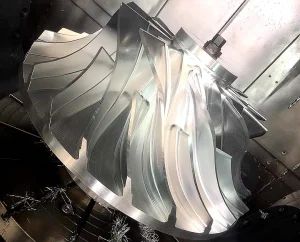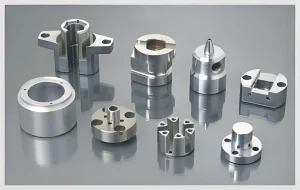Introduction
Precision machining companies are essential players in various industries. The term “industries” refers to a wide range of business sectors or fields. Precision machining plays a crucial “role” in these industries, fulfilling important functions. The role of precision machining companies can be compared to that of a key component in a complex machine, as they provide high-quality, accurately crafted components that are essential for the proper functioning of many products.
Precision machining is a highly specialized field that involves the use of advanced technologies and techniques to achieve extremely precise dimensions, shapes, and surface qualities. This process is often referred to as “precision machining,” which encompasses a variety of methods and processes to create components with exceptional accuracy.
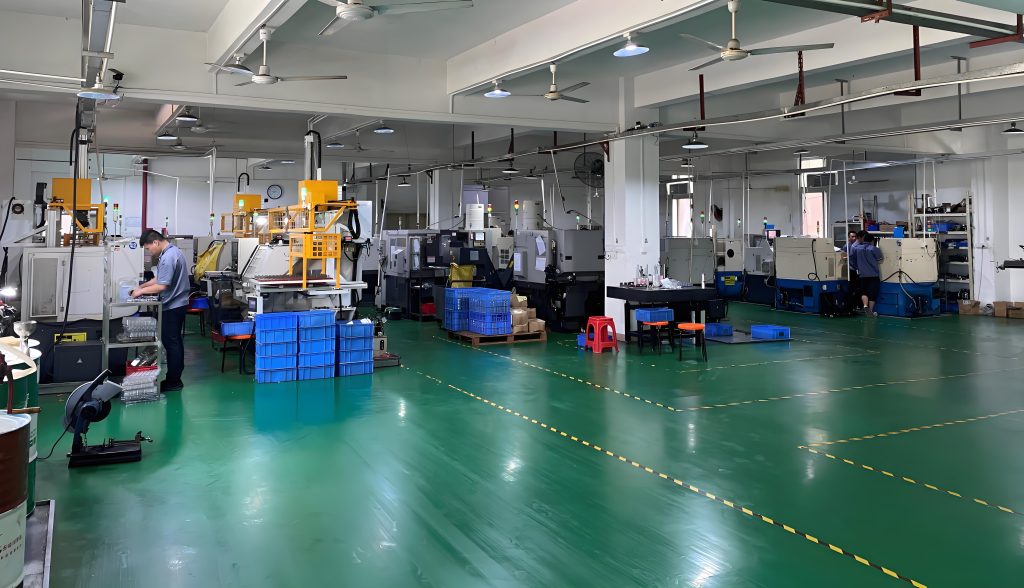
The importance of precision machining companies cannot be overstated. They contribute to the development and production of a wide range of products, from complex machinery and equipment to delicate electronic components. Their expertise and capabilities are essential for meeting the demanding requirements of modern industries.
In the following sections of this article, we will explore in more detail the processes, advantages, and future trends of precision machining companies. We will examine how these companies use advanced technologies and techniques to achieve high levels of precision and quality, and how they contribute to the growth and success of various industries.
What is a Precision Machining Company?
What is a Precision Machining Company?
A precision machining company is an enterprise that specializes in the creation of highly accurate and detailed parts through advanced machinery and techniques. Precision machining refers to a process that uses state-of-the-art equipment to achieve precise dimensions, shapes, and surface finishes.
These companies play a crucial role in various industries by providing high-quality components that are essential for the proper functioning of many products. The importance of precision machining companies cannot be overstated as they contribute to the development and production of a wide range of items, from complex machinery and equipment to delicate electronic components.
The precision machining process involves the use of advanced technologies and techniques to achieve extremely precise dimensions, shapes, and surface qualities. For example, precision machining may include milling, turning, and electrical discharge machining. These processes are often controlled using Computer Numerical Controls (CNC), which ensure accuracy and repeatability.
A precision machine today is generally equipped with state-of-the-art equipment that allows for close tolerance finishes. This means that the workpiece can be machined with a high degree of precision, resulting in parts that meet the exact specifications required by customers.
Some of the characteristics of precision machining include:
- High accuracy: Precision machining companies are able to achieve extremely precise dimensions, often within a few thousandths of an inch.
- Complex shapes: They can create parts with complex geometries that would be difficult or impossible to produce using other methods.
- Smooth surface finishes: The surface of precision machined parts is often very smooth, which can improve the performance and appearance of the final product.
In addition to traditional machining methods, precision machining companies may also use non-traditional techniques such as ultra-precision machining. This involves the use of advanced technologies and processes to achieve even higher levels of precision and quality.
The equipment used by precision machining companies is also state-of-the-art. This includes CNC machines, grinding equipment, electrical discharge machining (EDM) machines, and other advanced tools. These machines are capable of performing complex operations with high accuracy and repeatability.
For example, a CNC machine can be programmed to perform a series of precise movements to cut and shape a workpiece. The machine can be controlled using computer software, which allows for complex designs and tight tolerances.
Another important aspect of precision machining is quality control. These companies have strict quality control procedures in place to ensure that every part meets the required specifications. This may involve using advanced measurement equipment and techniques to verify the dimensions and surface finishes of the parts.
In conclusion, a precision machining company is an essential part of modern industry. They use advanced machinery and techniques to create highly accurate and detailed parts that are essential for the proper functioning of many products. With their state-of-the-art equipment and strict quality control procedures, these companies are able to meet the demanding requirements of today’s industries.
Processes Used by Precision Machining Companies
Machining Processes
Precision machining companies utilize a diverse range of processes to ensure the production of highly complex and accurate parts. Milling, turning, grinding, and Electrical Discharge Machining (EDM) are among the key techniques employed.
Milling is a process that involves removing material from a workpiece using a rotating cutting tool. It can create various shapes and features with high precision. Turning, on the other hand, is used to shape cylindrical parts by rotating the workpiece against a cutting tool. Grinding is employed to achieve smooth surface finishes and tight tolerances. EDM uses electrical discharges to remove material and is particularly useful for hard materials and complex geometries.
These processes are crucial for the production of parts that meet the exacting requirements of different industries. Whether it’s for the aerospace sector, where components need to withstand extreme conditions, or the electronics industry, where miniaturization and precision are essential, precision machining processes play a vital role.
Quality Control
Precision machining companies implement stringent quality control measures to guarantee that each part meets the required specifications. This is essential to ensure the reliability and performance of the final product.
Inspections are carried out at various stages of the manufacturing process. From the initial raw material inspection to in-process checks and final product inspections, every step is carefully monitored. Advanced measurement equipment and techniques are used to verify the dimensions and surface finishes of the parts.
For example, coordinate measuring machines (CMMs) are often employed to measure the geometry of parts with extremely high accuracy. These machines can detect even the slightest deviations from the specified dimensions.
In addition to dimensional inspections, surface finish inspections are also crucial. Surface roughness testers are used to measure the smoothness of the part’s surface. A smooth surface finish can improve the performance and durability of the part, as well as enhance its aesthetic appeal.
Quality control also extends to the materials used in the manufacturing process. Raw materials are inspected for quality and consistency to ensure that they meet the required standards. Any substandard materials are rejected to prevent defects in the final product.
Moreover, precision machining companies often have quality management systems in place, such as ISO 9001 certification. These systems provide a framework for ensuring consistent quality and continuous improvement.
By implementing strict quality control measures, precision machining companies can deliver high-quality parts that meet the demanding requirements of their customers and contribute to the success of various industries.
Advantages of Precision Machining Companies
High Accuracy
Precision machining companies are renowned for their ability to produce parts with an extremely high degree of accuracy. This is a crucial advantage that sets them apart in various industries. In the realm of modern manufacturing, where complex assemblies require precise fit and function, the high accuracy offered by these companies is indispensable.
The precision machining process involves the use of state-of-the-art equipment and advanced technologies. For example, Computer Numerical Controls (CNC) machines play a vital role in ensuring accuracy and repeatability. These machines can be programmed to perform a series of precise movements, cutting and shaping workpieces with a high degree of precision. As a result, parts can be machined to within a few thousandths of an inch, meeting the exact specifications required by customers.
The importance of high accuracy in precision machining cannot be overstated. It not only ensures the proper functioning of complex assemblies but also contributes to the overall quality and reliability of the final product. For industries such as aerospace, where components need to withstand extreme conditions, high accuracy is essential to ensure safety and performance. In the electronics industry, miniaturization and precision are crucial, and precision machining companies are able to create parts with complex geometries that would be difficult or impossible to produce using other methods.
Moreover, the high accuracy achieved by precision machining companies is also reflected in their use of advanced measurement equipment and techniques. Coordinate measuring machines (CMMs), for instance, are often employed to measure the geometry of parts with extremely high accuracy. These machines can detect even the slightest deviations from the specified dimensions, ensuring that every part meets the required specifications.
In conclusion, the high accuracy offered by precision machining companies is a major advantage that contributes to their success in various industries. By using advanced technologies and equipment, and implementing strict quality control measures, these companies are able to produce parts with exceptional precision, meeting the demanding requirements of modern manufacturing.
Customization
One of the significant advantages of precision machining companies is their ability to create custom parts according to specific customer requirements. This level of customization provides flexibility and innovation in the manufacturing process.
In today’s competitive market, businesses often need unique and specialized components to differentiate their products or meet specific application needs. Precision machining companies are well-equipped to handle these requests. They can work closely with customers to understand their exact specifications and design parts that are tailored to their specific requirements.
The customization process begins with detailed discussions between the customer and the machining company. The customer provides information about the part’s dimensions, shape, materials, and performance requirements. The machining company then uses this information to develop a custom design and manufacturing plan.
Using advanced machining processes such as milling, turning, grinding, and Electrical Discharge Machining (EDM), precision machining companies can create parts with complex geometries and tight tolerances. These processes allow for a high degree of flexibility in design, enabling the creation of parts that are not possible with traditional manufacturing methods.
For example, a company in the automotive industry may need a custom part for a new vehicle model. The precision machining company can work with the automotive manufacturer to design and produce a part that meets the specific requirements of the vehicle, ensuring proper fit and function.
In addition to providing custom parts, precision machining companies can also offer value-added services such as design assistance, prototyping, and quality control. These services help customers bring their ideas to life and ensure that the final product meets their expectations.
The ability to offer customization also allows precision machining companies to stay ahead of the competition. By providing unique and innovative solutions, they can attract new customers and build long-term relationships with existing ones.
In conclusion, customization is a major advantage of precision machining companies. By providing flexible and innovative solutions, they can meet the diverse needs of customers in various industries and contribute to the growth and success of their businesses.
Reliability
Precision machining companies are known for offering reliable products that meet the highest standards. This reliability is achieved through a combination of advanced technology, quality control, and skilled craftsmanship.
With advanced technology and state-of-the-art equipment, precision machining companies are able to produce parts with exceptional precision and quality. CNC machines, grinding equipment, electrical discharge machining (EDM) machines, and other advanced tools are capable of performing complex operations with high accuracy and repeatability. This ensures that every part produced meets the exact specifications required by customers.
Quality control is another key factor in ensuring reliability. Precision machining companies implement stringent quality control measures at various stages of the manufacturing process. From the initial raw material inspection to in-process checks and final product inspections, every step is carefully monitored to ensure that the parts meet the required standards. Advanced measurement equipment and techniques are used to verify the dimensions and surface finishes of the parts, ensuring that they are within the specified tolerances.
In addition to technology and quality control, skilled craftsmanship also plays a crucial role in reliability. Precision machining requires a high level of skill and expertise. Machinists must have a deep understanding of the machining processes and be able to operate the equipment with precision and care. Their attention to detail and commitment to quality ensure that every part produced is of the highest quality.
For example, in the aerospace industry, reliability is of utmost importance. Components used in aircraft and spacecraft must be able to withstand extreme conditions and perform flawlessly. Precision machining companies that supply parts to the aerospace industry must meet strict quality standards and adhere to rigorous testing and inspection procedures to ensure the reliability of their products.
Moreover, precision machining companies often have quality management systems in place, such as ISO 9001 certification. These systems provide a framework for ensuring consistent quality and continuous improvement. By adhering to these standards, companies can demonstrate their commitment to quality and reliability.
In conclusion, the reliability offered by precision machining companies is a major advantage that makes them an essential part of various industries. Through advanced technology, quality control, and skilled craftsmanship, these companies are able to produce high-quality parts that meet the demanding requirements of modern manufacturing.
Examples of Successful Precision Machining Companies
Some of the well-known precision machining companies have made significant contributions to various industries through their innovative approaches and high-quality products.
One such company is Seamounts Machinery Co., Ltd., which is renowned for its precision machining capabilities. As described in the resources, it is a company that specializes in precision machining and is known for its commitment to quality. Their products range from machining parts to CNC Precision machining, covering axles, tubes, flanges, and others. The use of advanced technologies and strict quality control measures ensure that their products meet the highest standards.
Another example is the Precision Machining Company in Lapeer, Michigan. This family-owned and oriented company has been in business since 1986 and has built a reputation on word of mouth and customer satisfaction. Specializing in CNC Machining and parts supplier for various manufacturing industries, they are proactive in utilizing advanced equipment and developing effective systems and processes. They are also ISO 9001:2015 certified, which further attests to their commitment to quality.
These companies contribute to different industries in several ways. In the aerospace sector, precision machining companies play a crucial role in producing components that need to withstand extreme conditions. The high accuracy and tight tolerances achieved by these companies ensure the safety and performance of aircraft and spacecraft. For example, components such as carbon-titanium monocoques, gold-anodized aluminum pushrod suspension links, and chrome-moly subframes with titanium heim-joints require precision machining to meet the exact specifications.
In the electronics industry, miniaturization and precision are essential. Precision machining companies are able to create parts with complex geometries that are crucial for the proper functioning of electronic devices. The smooth surface finishes provided by these companies can improve the performance and durability of electronic components.
The automotive industry also benefits from precision machining. Custom parts for new vehicle models can be designed and produced to ensure proper fit and function. Companies in this industry often need unique and specialized components to differentiate their products and meet specific application needs. Precision machining companies are well-equipped to handle these requests and offer value-added services such as design assistance, prototyping, and quality control.
Innovative approaches adopted by successful precision machining companies include the use of advanced technologies such as ultra-precision machining. This involves the use of advanced technologies and processes to achieve even higher levels of precision and quality. For example, the combined profilometer developed by some companies can be used to measure ultra-precision machining engineering surfaces, optical surfaces, and micro-nano geometric structures.
Another innovative approach is the implementation of strict quality control measures. Inspections are carried out at various stages of the manufacturing process to ensure that every part meets the required specifications. Advanced measurement equipment and techniques such as coordinate measuring machines (CMMs) and surface roughness testers are used to verify the dimensions and surface finishes of the parts.
In conclusion, successful precision machining companies like Seamounts Machinery Co., Ltd. and the Precision Machining Company in Lapeer, Michigan have made significant contributions to different industries through their high-quality products and innovative approaches. Their ability to achieve high accuracy, offer customization, and ensure reliability makes them essential players in modern industry.
Future Trends of Precision Machining Companies
Digital Transformation
The precision machining industry is not immune to the wave of digital transformation sweeping across various sectors. As the world becomes more connected and technology-driven, precision machining companies are also embracing digital technologies to enhance their operations and stay competitive.
3D printing is one such technology that is making significant inroads in the precision machining space. It allows for the creation of complex geometries and customized parts with ease. With 3D printing, precision machining companies can produce prototypes quickly and cost-effectively, enabling them to iterate and refine designs faster. This not only saves time but also reduces costs and increases innovation.
Artificial intelligence (AI) is another technology that is transforming the precision machining industry. AI-powered algorithms can analyze large amounts of data from production processes and predict potential issues before they occur. This enables companies to take proactive measures to prevent defects and improve quality. Additionally, AI can optimize production schedules and resource allocation, leading to increased efficiency and productivity.
Big data is also playing a crucial role in the digital transformation of precision machining companies. By collecting and analyzing data from various sources such as sensors on machines, production logs, and customer feedback, companies can gain valuable insights into their operations. This data can be used to identify areas for improvement, optimize processes, and make more informed decisions.
For example, Seamounts Machinery Co., Ltd. may use big data analytics to monitor the performance of its machines and identify patterns that indicate potential maintenance issues. By addressing these issues proactively, the company can reduce downtime and improve production efficiency.
The adoption of digital technologies in precision machining is not without challenges. Issues such as data security, integration with existing systems, and the need for skilled personnel to operate and maintain these technologies need to be addressed. However, the benefits of digital transformation far outweigh these challenges.
In conclusion, digital transformation is changing the landscape of precision machining. By embracing technologies such as 3D printing, artificial intelligence, and big data, precision machining companies can enhance their competitiveness, improve quality, and drive innovation.
Sustainable Practices
As environmental concerns continue to grow, precision machining companies are increasingly recognizing the importance of sustainable manufacturing practices. Not only is this good for the planet, but it also makes business sense in the long run.
One aspect of sustainable manufacturing is the use of eco-friendly materials. Precision machining companies are exploring the use of materials that are renewable, recyclable, or have a lower environmental impact. For example, instead of using traditional metals, some companies may opt for materials such as aluminum alloys or composites that are lighter and more sustainable.
Energy efficiency is another key area of focus. Precision machining companies are investing in energy-efficient machines and processes to reduce their energy consumption. This can include using advanced cooling systems, optimizing machine settings, and implementing energy management systems.
Waste reduction is also an important part of sustainable manufacturing. Precision machining companies are finding ways to minimize waste by optimizing production processes, reusing materials where possible, and recycling waste materials. For example, chips and swarf generated during machining can be recycled and reused in other applications.
In addition to these measures, precision machining companies are also looking at ways to reduce their carbon footprint. This may involve using renewable energy sources such as solar or wind power, implementing green transportation solutions, and participating in carbon offset programs.
For instance, the Precision Machining Company in Lapeer, Michigan may install solar panels on its roof to generate clean energy for its operations. This not only reduces the company’s reliance on fossil fuels but also demonstrates its commitment to sustainability.
Sustainable manufacturing practices not only benefit the environment but also enhance a company’s reputation and competitiveness. Customers are increasingly demanding sustainable products and are more likely to do business with companies that demonstrate a commitment to environmental responsibility.
In conclusion, as environmental concerns grow, precision machining companies are exploring sustainable manufacturing methods. By using eco-friendly materials, improving energy efficiency, reducing waste, and minimizing their carbon footprint, these companies can contribute to a more sustainable future while also enhancing their business prospects.
Global Expansion
The increasing demand for precision parts globally is presenting significant opportunities for precision machining companies to expand their operations into international markets.
The growth in demand for precision parts is driven by several factors. Firstly, the rapid development of industries such as aerospace, electronics, and automotive is creating a need for high-quality, precision-engineered components. Secondly, globalization has led to an increase in cross-border trade and cooperation, making it easier for companies to access international markets.
To capitalize on these opportunities, precision machining companies are adopting various strategies for global expansion. One common approach is to establish partnerships and collaborations with local companies in target markets. This allows them to leverage local knowledge and resources, overcome regulatory barriers, and gain a foothold in new markets.
Another strategy is to invest in advanced manufacturing facilities and technologies in different regions. This enables companies to meet the local demand for precision parts more efficiently and effectively. For example, a precision machining company may set up a production facility in Asia to serve the growing demand from the electronics industry in the region.
In addition to these strategies, companies are also focusing on marketing and brand building to increase their visibility in international markets. This may involve participating in trade shows, exhibitions, and conferences, as well as leveraging digital marketing channels to reach a wider audience.
For instance, Seamounts Machinery Co., Ltd. may participate in an international aerospace exhibition to showcase its precision machining capabilities and connect with potential customers from around the world.
However, global expansion also comes with challenges. These include cultural differences, language barriers, regulatory compliance, and logistical issues. To overcome these challenges, companies need to have a clear understanding of the local market conditions, develop strong relationships with local partners, and implement effective risk management strategies.
In conclusion, the increasing demand for precision parts globally is leading to the expansion of precision machining companies into international markets. By adopting appropriate strategies and overcoming challenges, these companies can tap into new growth opportunities and contribute to the global economy.
Conclusion
Precision machining companies are truly at the vanguard of modern manufacturing. Their ability to combine advanced technologies, strict quality control, and customization options makes them indispensable in a wide range of industries.
As technology continues to evolve, precision machining companies will play an even more crucial role. The digital transformation that is sweeping across various sectors is also making its mark on precision machining. Technologies like 3D printing, artificial intelligence, and big data are enabling these companies to enhance their operations, improve quality, and drive

